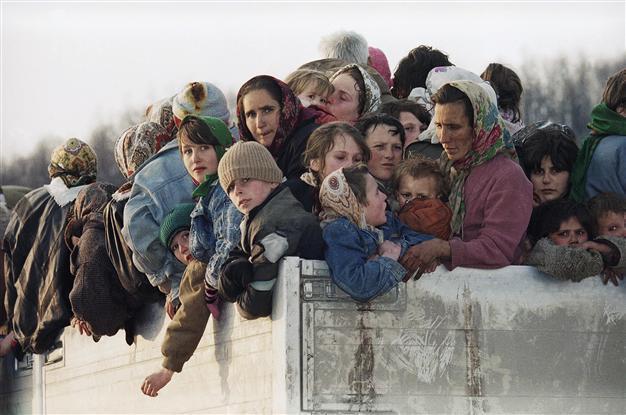Judge postpones evidence in Mladic trial
THE HAGUE - The Associated Press

In this Monday March 29, 1993 file photo evacuees from the besieged Muslim enclave of Srebrenica AP Photo
The presiding judge in the U.N. trial of Gen. Ratko Mladic has delayed indefinitely the presentation of evidence that had been scheduled to start later this month due to "errors" by prosecutors in disclosing evidence to defense lawyers.Alphons Orie said Tuesday he was delaying the Yugoslav war crimes tribunal case due to "significant disclosure errors" by prosecutors who are obliged to share all their evidence with Mladic's defense team.
He says judges are still analyzing the "scope and full impact" of the error.
He says he aims to establish a new starting date "as soon as possible." Prosecutors already had admitted the errors and did not object to a delay in the trial. Mladic's attorney has asked for a six-month delay.
Prosecutors lay out Srebrenica case against Mladic
Prosecutors on Thursday were outlining their evidence of the alleged involvement of former Bosnian Serb military chief Gen. Ratko Mladic in Europe's worst mass murder since World War II, the 1995 Srebrenica massacre.
On the second day of the 70-year-old's genocide trial, Yugoslav war crimes tribunal prosecutors will focus on the bloody climax of the 1992-95 Bosnian war, when Serb forces systematically executed some 8,000 Muslim men and boy in the U.N.-protected enclave in northeastern Bosnia and buried them in mass graves.
Mladic is accused of commanding Bosnian Serb troops who waged a campaign of murder and persecution to drive Muslims and Croats out of territory they considered part of Serbia. His troops rained shells and snipers' bullets down on civilians in the 44-month-long siege of the Bosnian capital, Sarajevo.
He has refused to enter pleas, but denies wrongdoing.
On Wednesday, the frail, 70-year-old defendant had an angry exchange of hand gestures with the families of massacre victims in the public gallery, separated by the bulletproof glass in the courtroom.
"Vulture!" said one woman in the gallery.
Mladic fled into hiding after the war and spent 15 years as a fugitive before international pressure on Serbia led to his arrest last year. Now he is held in a one-man cell in a special international wing of a Dutch jail and receives food and medical care that would likely be the envy of many in Bosnia.
But the fact that he is jailed and on trial is seen as another victory for international justice and hailed by observers as evidence that more often than not war crimes tribunals get their indicted suspects, even if years later.
Prosecutors say they will use evidence against Mladic from more than 400 witnesses, although very few of them will testify in court. Much of their evidence already has been heard in other cases and will be admitted as written statements.

















